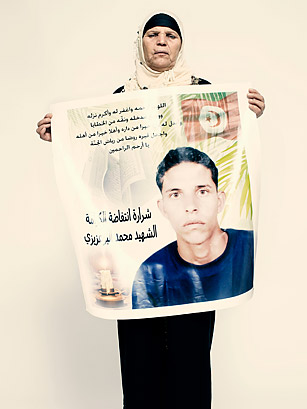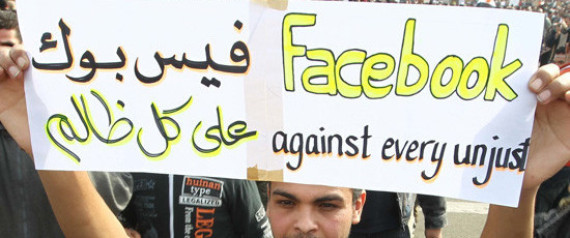2011: A revolutionary year in democracy and governance

"Mohamed suffered a lot. He worked hard. But when he set fire to himself, it wasn't about his scales being confiscated. It was about his dignity." —Mannoubia Bouazizi, Tunisia Photograph by Peter Hapak for TIME
2011 will be remembered as the year that democratic awakening occurred in the Middle East and North Africa (MENA) region. Activists used information and communication technology (ICT) tools to organize and coordinate political demonstrations that brought an end to long-standing regimes and paved the way to landmark elections.
Time Magazine fittingly awarded the “Person of the Year” accolade to the protester. What would come to be known as the “Arab Spring” began in Tunisia’s under-developed town of Sidi Bouzid, where the late Mohamed Bouazizi, a street vendor whose wares were confiscated by the police, set himself on fire outside of a government building in December 2010. Few would have predicted that Bouazizi’s actions would trigger an uprising that brought an end to Zine El Abidine Ben Ali’s 23-year-old regime on January 14th.
Video clips of the first protests, including demonstrations at the spot where Bouazizi set-himself on fire, were recorded on mobile phones, posted on YouTube, and spread across Tunisia and in the Arab world when they were shared on Facebook before news media outlets such as Al Jazeera began running their stories, reports Robert Mackey in the New York Times.
The Tunisian revolutionary spirit spread in neighboring Egypt. Inspired by events in Tunsia, political demonstrations began in January as thousands took to the streets in anti-government protests against poverty, rampant unemployment, corruption, and demanding an end to the 30-year autocratic rule of President Hosni Mubarak, writes Cara Parks in The Huffington Post.
Aware of the potent effect that social media had in Tunisia’s uprising, the Egyptian government blocked Facebook, Twitter, and later Internet services to lead a crackdown on the largest protests the country had witnessed since 1970s, according to Parks. Despite violent clashes with the riot police, protests kept going not only in Cairo, the capital, but also in Alexandria and Suez, and two other major cities.
The revolution’s main goal was achieved with the resignation of President Mubarak on February 11th. Activist Wael Ghonim, a marketing manager for Google who played a significant role in organizing the January 25 protests by reaching out to young Egyptians on Facebook, credited the social networking site for the success of the Egyptian people’s uprising, says Catharine Smith in The Huffington Post.
“[…] This revolution started on Facebook. […] We would post a video on Facebook that would be shared by 60,000 people on their walls within a few hours. I’ve always said that if you want to liberate a society just give them the Internet. […],” Ghonim told CNN’s Wolf Blitzer in an interview that Facebook and the Internet were responsible for the uprising in Egypt.
After Egypt, it was the turn of Syrians to protest against President Bashar al-Assad’s regime. Pro-democratic demonstrations began in January and young Syrians, inspired by the ousting of Ben Ali in Tunisia and Mubarak in Egypt, began organizing protests online and then took them to the streets.

In this citizen journalism image made on a mobile phone, Syrian men carry bread loaves during a protest against Syrian President Bashar Assad's regime, in the coastal town of Banias, Syria, May 3, 2011 Photo Credit: AP
Syrian activists have been working their computers and mobile phones, updating Facebook pages, sending out messages over Twitter, and uploading videos onto YouTube to inform the outside world of what was taking place in their surroundings since foreign reporters were banned, reports Margaret Besheer for VOA news.
Libya was the revolution’s next stop in North Africa . Protests broke out in February in the eastern city of Benghazi and escalated to an armed conflict as forces loyal to Muammar Gaddafi clashed with anti-government rebels. Gaddafi was captured and killed on October 24 bringing an end to four decades of autocratic rule.
Libya Crisis Map illustrates how ICTs can be applied in a conflict situation. This web-based platform was created by the Standby Task Force, and used the Ushahidi crowdsourced crisis reporting system to map latest news from Libya gleaned from Twitter and traditional news sources.

The LibyaCrisisMap platform was activated by the request of the Office for the Coordination of Humanitarian Affairs (OCHA) to the Standby Task Force (SBTF). The platform was fully handed over to OCHA supervision in April 2011, and continued to be supported by a team of volunteers until June 4th of 2011.
Yemenis also took up the streets in February to protest against President Ali Abdullah Saleh calling for his resignation. Saleh agreed a deal, in which he will transfer power to his deputy by February 2012, ahead of elections. Young Yemeni Activists are however angry that the deal guarantees immunity for Mr Saleh and his allies, reports the BBC.
The Kingdom of Bahrain, with financial, equipment and manpower backing from its Saudi neighbor, is the only government in the MENA region to have successfully crushed pro-democracy demonstrations, reports Adrian Humphreys in the National Post.
Revolutions in the spring paved the way to landmark elections in the fall.
Tunisian politicians engaged voters via YouTube ahead of the October 23rd elections of representative for the new Constituent Assembly, which will ratify a new constitution and appoint a new transitional government that will schedule elections for a permanent government. Tunisia Live, a startup news portal, launched Tunisia Talks on YouTube where citizens asked questions to politicians.
Egyptians also queued up in numbers at polling stations in the country’s first democratic elections. Citizens took up the responsibility to monitor the electoral process blogging and Tweeting about irregularities and fraudulent activities. Parliamentary elections will end in March and Presidential elections are scheduled for mid-2012.
ICTs in form of social media platforms, cell phones, and the Internet played a significant role in the push for democracy and governance not only in the MENA region but also throughout the world.





































